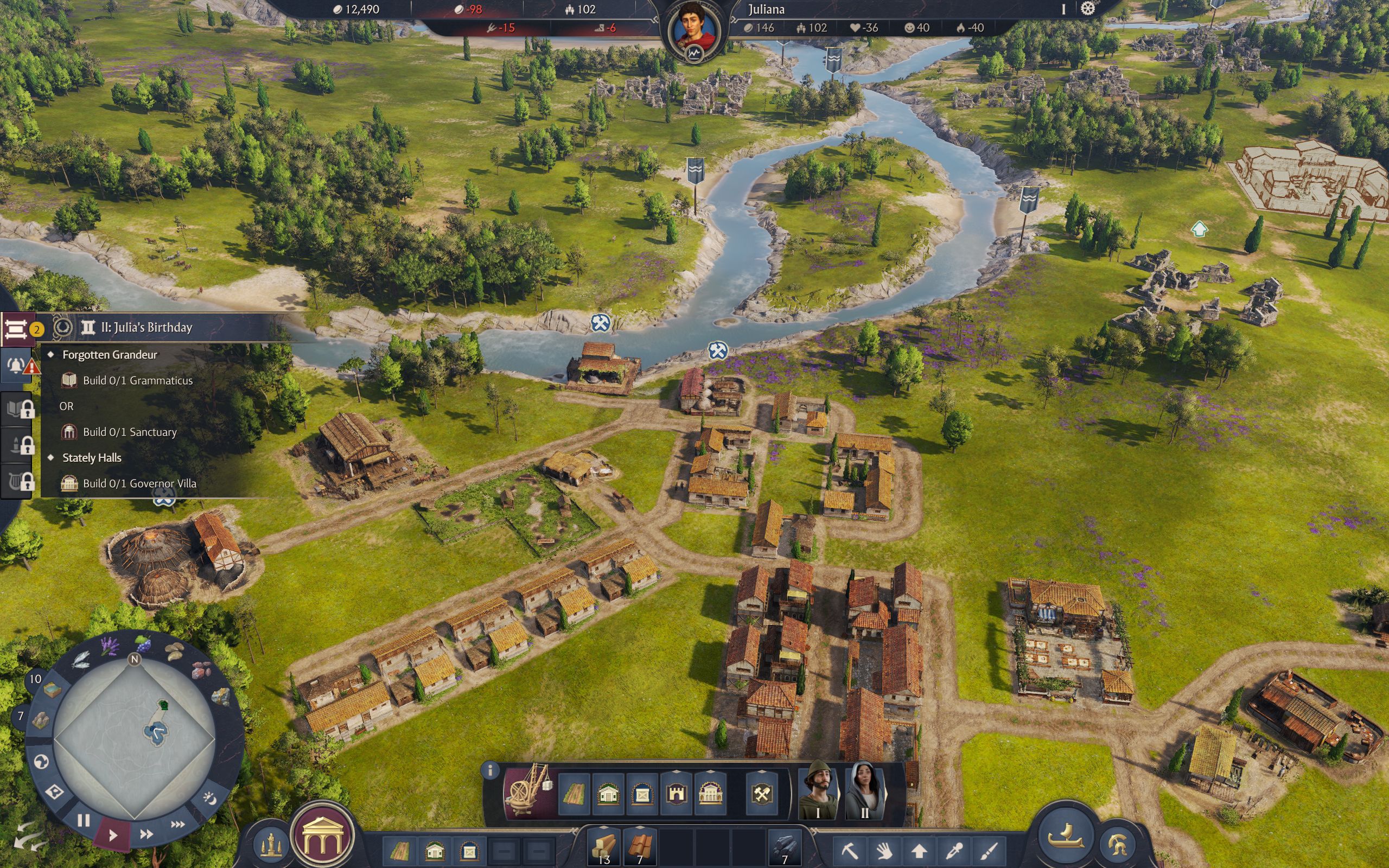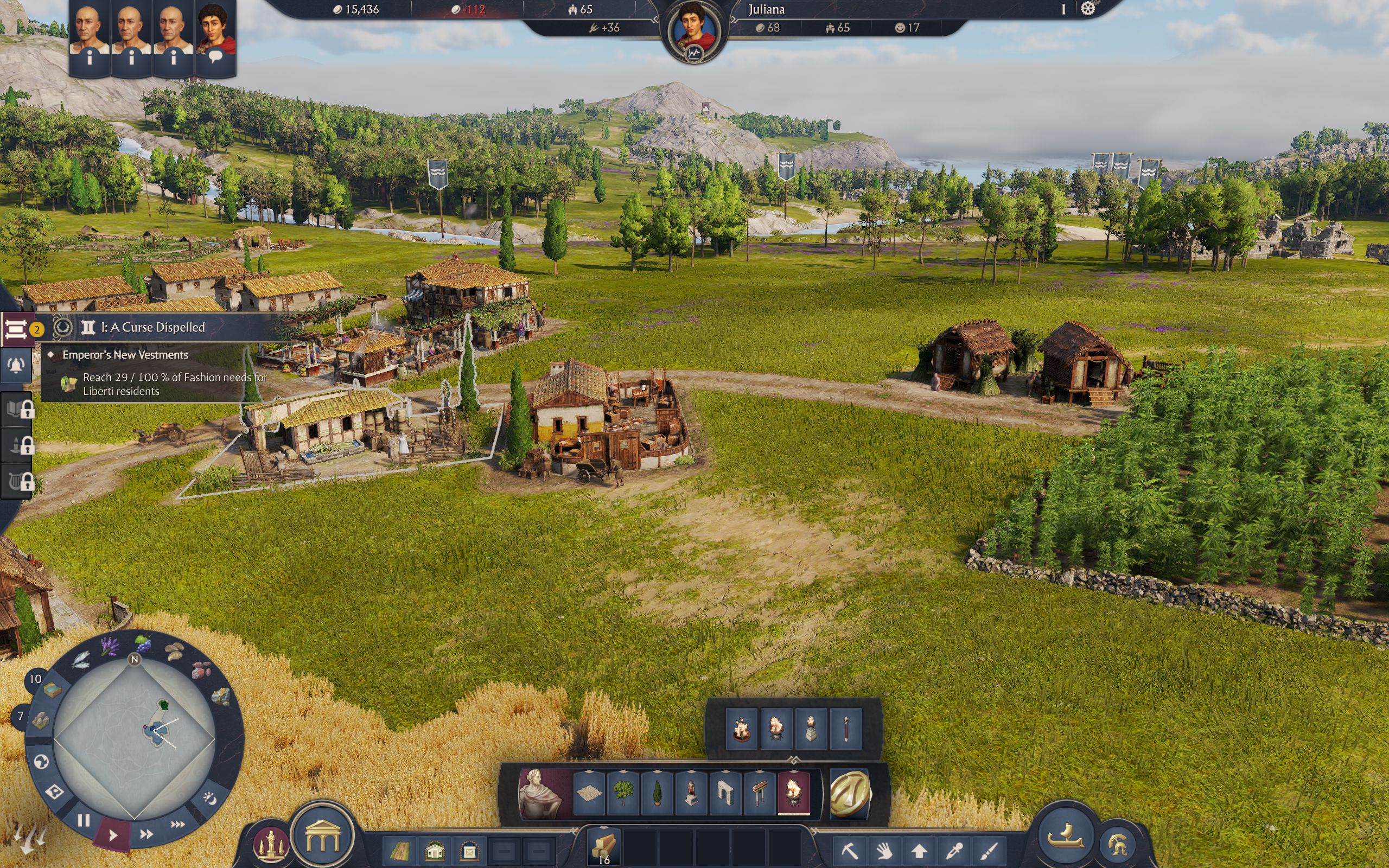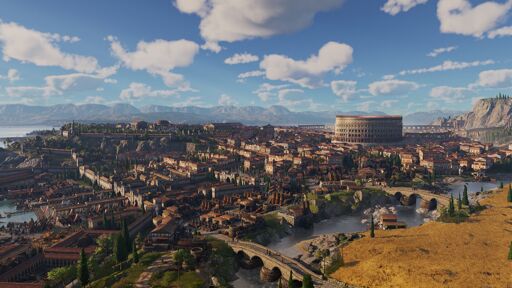It wasn’t built in a day, famously. But this latest Anno in a long-running series of accessible and endearingly twee city builders doesn’t take that old adage overly to heart. There’s complexity to its supply chains and economy, but it takes a ruthless writers’ pen (quill?) to the systems-bloat and perplexing menu rabbit holes found elsewhere in the genre. As a result, overseeing a burgeoning Roman territory feels far less like filling in a tax return than other city builders, and more like the power fantasy that we probably all showed up for in the first place.
Need to Know
What is it? A city builder in Roman sandals, with RPG-style dialogue trees.Release date November 13, 2025Expect to pay $60/£50Developer Ubisoft MainzPublisher UbisoftReviewed on i7 9700K, RTX 2080 TI, 16GB RAMSteam Deck TBALink Official site
The Pax Romana era was a golden age for the be-sandaled denizens of the Roman empire, full of peace, prosperity and neatly laundered togas. Developer Ubisoft Mainz uses this happy clappy context well for a bit of early game tutorialising, trotting you through some basic supply chain creation via a menu layout that will feel like stepping into worn-in old shoes to Anno 1800 players, but which Tropico or Cities Skylines veterans would find almost confrontationally straightforward: you begin by clicking on the resource you’d like your citizens to start making, then—from a pop-up menu which shows you the buildings required to make it—you drop the necessary structures into the world. Simplicity itself, and enough to make you wonder why almost every other game does this process in reverse.

(Image credit: Ubisoft)
There’s plenty of subtlety to even this most basic action, though. Placing those structures in positions that are both geographically close to the resources they need, close to each other, and in areas that might trigger productivity or happiness bonuses, is not easy to achieve, and introduces a nice puzzle-like wrinkle to the way you lay out your cities. It does mean that you eventually see your initial settlement for the trashpile of inefficiency that it is when you become better attuned to those variables, and will probably want to bulldoze the lot and start again, but hey, it’s a golden era. No one’s out to get you. You’ve got time and space to make mistakes.
Or have you? This is where Anno 117’s interactive narrative element shows up to enrich the scintillating garum hut-placing action, and with some surprising twists, too. As an inexperienced governor and something of an outsider to the Emperor’s inner circle, you’re just trying to keep your head down and follow Emperor Lucius’ orders without asking too many questions or trying to let your sense of intimidation at the sheer majesty of the guy’s eyebrows become evident.
Cloak and dagger
Via a series of infrequent cutscenes with a few dialogue trees, you’re made to feel as though perhaps Lucius and his family aren’t taking you as seriously as they might. There’s his sniffy tone, for one. And the missions he gives you, which amount to nothing more than delivering supplies to his wife’s island so that she can throw a lavish party. And the massive cash payment he demands of you, with no repayment terms. Something about this relationship might not be as peaceful and happy-clappy as the vigorously cheerful colour palette has been suggesting.

(Image credit: Ubisoft)
Speaking of that, what a handsome game this is. It’s unlikely that CD Projekt will be tearing up their Witcher IV screenshots in despair as a result of Anno 117’s fairly low-poly fishing huts and amphitheaters, but there’s a lot of character to every building. Enough that I found myself regularly zooming right in on each one just to watch a day in the life of its workers. Meanwhile at mid-zoom, the combination of dramatic clouds, rolling hills, burning braziers and gently lilting wheat fields is enough to relax all the muscles in your neck that stiffen during a day of living life in 2025. When the score kicks in too, it’s basically Roman novocaine.
As your territory expands north, Anno 117’s next trick is to introduce Celtic settlements, using that characterful art direction to muster some wonderfully misty, boggy landscapes where thatched mud huts meet with Roman architecture. In other games the process of expanding your domain is about colouring in the world map your colour, or imposing your culture on every other settlement, but Anno 117’s approach is to let the Celts be Celts, augmenting their way of life with your newfangled viaducts rather than steamrolling everything and building over it until it looks like Caesar’s backyard.
Peaceful stupor
Is the sense of jeopardy high enough, though? There’s an hour or two after you’ve ticked off the basics in which it feels like it might not be. There are no invading troops from rival empires or clans lurking on the horizon, not for quite a while, and the story’s still in exposition mode, yet to surface the skullduggery that’s to come. But the drama happens anyway—at least, it did in my save. Because I completely ran out of money.

(Image credit: Ubisoft)
Part of it was accepting Lucius’ massive monetary tribute, certainly. Another element was allowing my resources to pile up in my storage warehouses without any trade agreements set up. There’d been my reckless spending on upgrading far too many buildings from Liberalis to Plebian dwellings, without a watertight understanding of how doing that would affect my workforce, and thus, income. And so it wasn’t long before I was reading a handy pop-up message about the implications of going totally bankrupt, and game over states.
In the nick of time, I adjusted my warehouse to sell off all the goods I was producing whenever I had a certain number of them in reserve. Terracotta tiles: got more than 20 of them? Flog them. Garum? Drowning in the stuff, get it sold. Stinking the place out anyway.
Doing this made me really understand, for the first time, why it’s important to build supply chains efficiently and in a way that triggers as many bonuses to nearby buildings and citizens as possible. Without giving me a specific objective or a single cutscene with a bathhouse burning, the game had created a moment of brinksmanship, tension, and learning.

(Image credit: Ubisoft)
It was swiftly followed by many more structured moments of drama, mind you. The military element doesn’t kick in for quite a while in the narrative campaign and isn’t a primary focus, but it’s there. So are your advisors, popping up with dilemmas for you to resolve. For example, I’d just constructed a lovely new governor’s mansion. You know the kind: tastefully placed trees lining the ostentatious access road. One or two magnificent statues within its grounds. My faithful advisor Ben-Baalion told me we could hire a specialist to work there, one of two brothers specifically. The eldest was thick as mince but could get workers going like the clappers, boosting productivity. The younger is a wizard with an accounting book but cares for little else, boosting income. It could have just shown me two avatars with some stats and had me drop one into a slot, but as is so often the case across its systems, Anno 117 went the extra mile.
A small step
It wants you to be just as directly, personally involved in its multitheist religious system, which can be used to spread influence between settlements, Civ-style, and in its vast research tree. It keeps you grounded in the shoes of an actual governor, rather than an omnipotent force in the sky who can bring down buildings at will, by having you travel around between islands by ship, sailing the world map to converse with other governors, renegade royal daughters, slavers and the like. It takes time to cover that ground on the ocean, and in that ground you feel the sense of accomplishment of being one tiny spec on the map who’s built a vast society. A small but significant touch.

(Image credit: Ubisoft)
There isn’t a confident stride forwards here from Anno 1800’s very accomplished refinement of the age-old Anno experience. And there didn’t need to be, especially. Instead, Anno 117 finds a reason for being with its setting and characterisation, giving you new resources and supply chains using a ready-made and polished interface. At times it borders on so friendly and non-threatening to your endeavours that you feel like you could leave it unattended for an hour and return to find everything absolutely fine. At others, the sequence of events required to tick off the next chapter objective feels so long and incremental that you wonder if you’ll achieve anything at all of note this evening with it. Both of those are challenges to my content-fried brain at times.
But most of the time, the experience of letting Anno 117 wash over me at its own pace is actually therapeutic. Order is relatively easy to achieve in this realm, and although there are forces who periodically threaten it, they’re neither numerous nor vicious enough to disturb an overall atmosphere of Sunday night TV. This is more about placing a viaduct for maximum economic and aesthetic impact than it is about conquering anything or proving your skills as a civil administrator, and I’ve been surprised to find that’s exactly the pace to keep me compelled towards this chocolate-box depiction of Rome.
From PCGamer latest via this RSS feed


